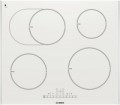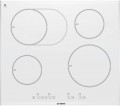Input power
The input power of the hob is the maximum electric power consumed during its operation. This parameter is indicated only for models that are equipped with at least one electric hotplate. It is electric burners that are the highest consumption in terms of energy consumption. Additional functions such as auto-ignition require little energy, and a regular outlet is enough for them.
First of all, the requirements for the power mains depend on this parameter: it must be able to provide such power without overloads. It is worth noting that for household sockets the power limit is about 3 – 3.5 kW, with more power, you need to connect the hob to 230 V mains according to special rules. An alternative is to use a three-phase 400 V mains: most modern hobs with electric burners allow connection to both 230 V and 400 V mains.
Frame
The presence of a metal
frame in the design of the hob. Such a frame can be located both around the entire perimeter of the device (in most classic models) and only on one side (usually in domino hobs, see "Design" for more details). The frame plays an aesthetic role, allowing you to optimally fit the hob into the overall design of the kitchen. However, it can also perform a very practical function: to retain liquids spilt onto the surface. On the other hand, such protection also has disadvantages: it can be quite difficult to clean dirt near the frame, and the liquid retained on the hob can burn, making cleaning even more difficult. So in terms of cleaning,
models without a frame are more convenient.
Dimensions (WxD)
General dimensions of the device in width and depth. Depth, in this case, refers to the distance from the leading edge to the trailing edge (when viewed from the user's side). Note that the external dimensions of the hobs are often larger than the dimensions for embedding (see below).
Cut-out dimensions (WxD)
The size of the opening that needs to be made in the kitchen countertop for the normal embedding of the hob. By default, the width and depth are indicated — the size of the opening along the front and side sides, respectively (when viewed from the user's side). Note that the dimensions of the hob itself are usually larger than the dimensions for embedding: when installed in an opening, the upper part of the surface rests on its edges, so that the device does not fall into the countertop.

